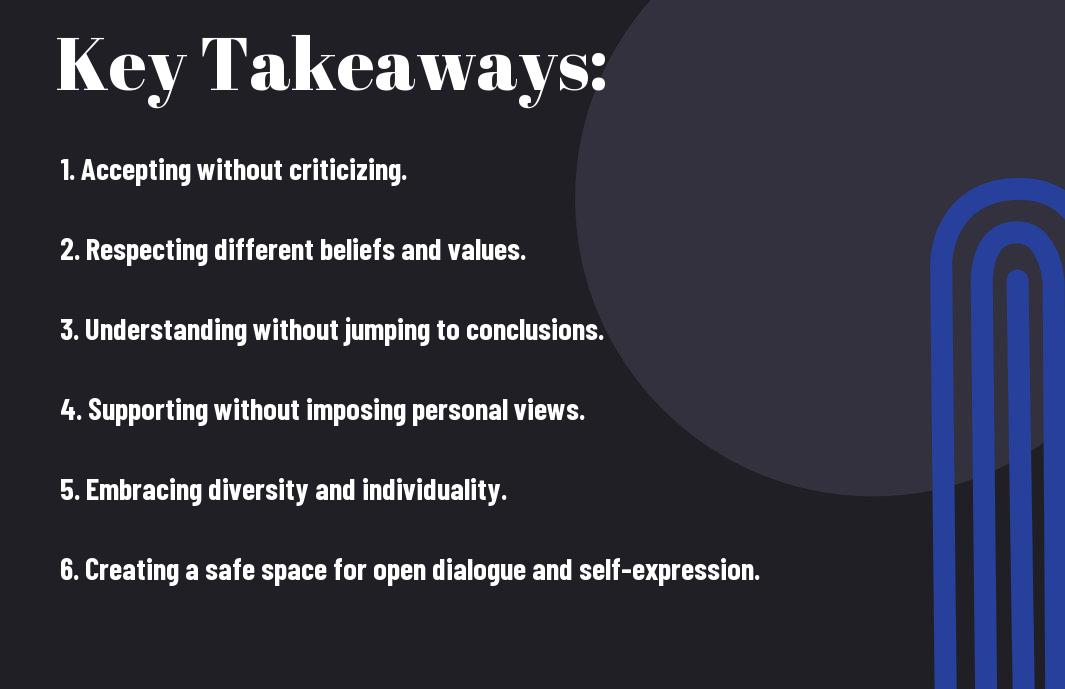Last Updated on August 18, 2024 by Muzammil Ijaz
Understanding the essence of a non-judgemental attitude in social work is crucial for practitioners in the field. It involves the ability to set aside personal biases and preconceptions when working with individuals from diverse backgrounds and situations. This approach allows social workers to create a safe and supportive environment where clients feel respected and understood without fear of criticism. Embracing a non-judgemental attitude promotes trust, empathy, and effective communication, which are imperative components for building meaningful relationships with individuals seeking help. Let’s investigate deeper into the significance of adopting a non-judgemental stance in social work practice.
Key Takeaways:
- Empathy and Understanding: A non-judgmental attitude in social work involves demonstrating empathy and a deep understanding of the client’s feelings, experiences, and perspectives.
- Respect for Diversity: Social workers with a non-judgmental attitude respect the diverse values, beliefs, and cultures of their clients without imposing their personal opinions or biases.
- Unconditional Positive Regard: Upholding an attitude of unconditional positive regard means accepting and supporting clients regardless of their behaviors, choices, or circumstances, fostering a safe environment for growth and change.

The Principles of Non-Judgmental Practice
Empathy and Respect
On the foundational principles of non-judgmental practice in social work is the demonstration of empathy and respect towards clients. This involves the ability to understand and share the feelings of the individuals being served, while treating them with dignity and honoring their autonomy. Empathy and respect are crucial in building a trusting relationship with clients, allowing for open communication and collaboration in the problem-solving process.
Active Listening and Understanding
Understanding the practice of active listening is key in non-judgmental social work. Active listening entails fully concentrating, understanding, responding, and remembering what is being said by the client. It goes beyond just hearing the words spoken and involves tuning into the emotions and underlying messages conveyed. This skill enables social workers to gain a comprehensive understanding of the clients’ needs and experiences, which is vital in providing appropriate support and interventions.
Non-Judgmental Attitude in Action
Establishing Trust with Clients
With a non-judgmental attitude, social workers can establish trust with clients more easily. By setting aside personal biases and preconceived notions, social workers create a safe space where clients feel accepted and understood. This trust forms the foundation of a strong therapeutic relationship, crucial for effective social work practice.
Collaboration and Empowerment
With a non-judgmental attitude, social workers can collaborate with clients in their journey towards empowerment. By respecting clients’ autonomy and choices, social workers enable them to make informed decisions about their lives. Collaboration empowers clients to take control of their situations and work towards positive change.
The key to successful collaboration and empowerment lies in the social worker’s ability to relinquish power and control, allowing clients to lead the way in setting goals and making decisions. This shift in dynamics fosters a sense of ownership and self-determination among clients, leading to more sustainable and meaningful outcomes. It is crucial for social workers to recognize the strengths and resilience of their clients, empowering them to navigate challenges and achieve their potential.
Challenges to Maintaining Non-Judgmental Attitude
Personal Biases and Prejudices
For social workers, one of the biggest challenges in maintaining a non-judgmental attitude is overcoming personal biases and prejudices. These deeply ingrained beliefs can influence how we perceive and interact with clients, leading to unfair treatment and barriers to effective communication. It is crucial for social workers to actively identify and address their biases to ensure that they are providing equitable and unbiased support to those in need.
Emotional Resilience and Self-Care
On the other hand, emotional resilience and self-care are crucial factors in maintaining a non-judgmental attitude. Social work is a demanding profession that involves constant exposure to challenging situations and emotional distress. Without proper self-care practices and emotional resilience, social workers may be at risk of burnout and compassion fatigue, which can hinder their ability to remain non-judgmental and empathetic towards clients.
Prejudices can also pose a significant obstacle to upholding a non-judgmental attitude in social work. These deeply rooted negative attitudes towards certain groups of people can cloud judgment and interfere with the ability to provide fair and impartial services. Social workers must actively challenge and unlearn prejudices to ensure that they are approaching their work with an open mind and a commitment to justice and equality.
Strategies for Developing a Non-Judgmental Attitude
Professional Training and Self-Reflection
Now, one of the key strategies for developing a non-judgmental attitude in social work is through professional training and self-reflection. The process involves continuous learning, attending workshops, and seeking supervision to enhance self-awareness and understanding of personal biases.
Cultural Competence and Diversity Awareness
The foundation of a non-judgmental attitude lies in cultural competence and diversity awareness. Cultural humility and sensitivity towards diverse populations are important in understanding the unique backgrounds and experiences of individuals. Embracing diversity and acknowledging one’s own preconceptions are crucial in fostering a non-judgmental approach.
Cultural competence involves not only understanding different cultures but also actively challenging stereotypes and biases. Social workers need to continually educate themselves on the diverse norms, values, and beliefs of different communities to provide effective and respectful services. By embracing a culturally competent approach, social workers can create a safe and inclusive environment for their clients.
To wrap up
As a reminder, a non-judgmental attitude in social work involves setting aside personal biases and preconceived notions to create a safe and supportive environment for individuals seeking help. By practicing empathy, active listening, and cultural humility, social workers can foster trust and build strong relationships with clients from diverse backgrounds. Embracing a non-judgmental approach allows social workers to provide more effective support and empower individuals to make positive changes in their lives. It is crucial to remember that everyone deserves to be treated with dignity and respect, regardless of their personal circumstances or choices.
FAQ
A: A non-judgmental attitude in social work refers to approaching individuals without letting personal biases, assumptions, or preconceived notions affect your interactions with them. It involves accepting people for who they are without passing any moral or value judgments on their behaviors, beliefs, or circumstances.
A: A non-judgmental attitude is crucial in social work as it is important for building trust and establishing a positive relationship with clients. It creates a safe and supportive environment where individuals feel comfortable expressing themselves without fear of being criticized or misunderstood. This attitude also helps social workers remain objective and focus on the best interests of their clients.
A: Social workers can practice a non-judgmental attitude by actively listening to clients without interrupting or imposing their opinions. They should show empathy and respect towards clients’ experiences and perspectives, even if they differ from their own. It is important to suspend personal judgments, cultivate self-awareness, and continuously reflect on any biases that may influence their interactions with clients.
Blogger By Passion, Programmer By Love And SEO Expert By Birth.This Quote Explain Me Perfectly. I did Bachelor’s in social work from the University of Sargodha
